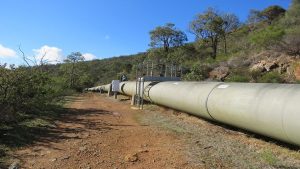Population growth and climate change are putting increasingly intense pressure on the planet’s limited water supplies, with worsening shortages emerging from the Middle East to Asia and Latin America, researchers and bankers said on Monday.
“All the local crises around the world are building up to a global crisis,” Torgny Holmgren, executive director of the Stockholm International Water Institute, told a conference on the issue at London-based think-tank Chatham House.
But easing the threat and ensuring more people have access to a stable, safe water supply will be hugely challenging because water access and distribution are tied up in politics, cultural views and entrenched systems, conference speakers said.
In Jordan, the third most water-scarce country, raising water prices to reflect the shortage would make economic sense -but not when nearly 1.5 million Syrian refugees, on top of 9 million citizens, depend on it, said Craig Davies of the European Bank for Reconstruction and Development (EBRD).
“It’s potentially a powder keg,” said Davies, who heads climate resilience investments for the bank. “From a political point of view, it’s imperative to keep water tariffs very low.”
Uzbekistan, meanwhile, has built its economy on exports of thirsty cotton, something that might not make sense as water becomes more scarce. But “you can’t adjust that very easily”without upsetting farmers and the economy, Davies added.
In North Africa, newly available solar-powered water pumps are giving drought-hit farmers crucial access to irrigation -but also removing incentives to use water sparingly as farmers no longer have to buy fuel for diesel-powered irrigation pumps.
“There is literally no control,” said Annabelle Houdret, a senior researcher at the German Development Institute who works in the region. Aquifers there could be depleted, she warned.
In many Islamic countries, water is seen as a human right and a gift from God, so asking governments to charge people for better water services can be complicated, Davies said.
In most places the EBRD works, the price users pay for water is far below the actual cost of bringing it to them, he said, meaning there is often too little money to invest in treating and delivering water, and maintaining and expanding networks.
“If you’re not paying a rational price for the water, the incentive is to use the water irrationally,” he added.
Getting water use right in an increasingly parched world is crucial, said Olcay Unver, vice chair of UN-Water, a coordinating agency on water issues for the United Nations.
Three out of every four jobs globally depend on water in some way, including small-scale farmers who produce 80% of the world’s food, said Unver, who is also a water advisor for the United Nations Food and Agriculture Organization (FAO).
By 2050, FAO estimates food demand globally will rise by 50% but “we don’t have 50% more water to allocate to agriculture”, he noted, adding it is already the dominant water user.
Demand for water is also surging in fast-growing cities, where more than half of people live now and over two-thirds are expected to live by 2050, Unver said.
Getting enough water to everyone is particularly difficult as climate change brings more erratic rainfall, with many places hit by floods and droughts in turn, conference speakers said.






